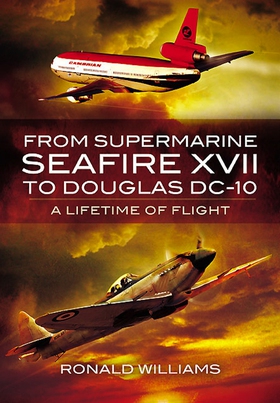
Lägg till önskelistan
From Supermarine Seafire XVII to Douglas DC-10 e-bok
Pris
115 kr
Ron Williams’ flying career started in the Royal Naval Volunteer Reserve which he joined for his National Service in the 1950s. Having completed this he became a civilian pilot and embarked on a career that would see him flying an amazing variety of aircraft in all parts of the world.
His first operational naval aircraft was the Seafire XVII, a direct descendent of the Spitfire. This aircraft was capable of 480 knots, and it was during his first solo flight in one that he very nearly k...
E-Bok
115 kr
Pris
Förlag
Pen and Sword
Utgiven
23 Februari 2021
Längd
256 sidor
Genrer
Historia & Arkeologi, Samhälle Och Politik, Biografier & Memoarer, Fackböcker
Språk
English
Format
epub
Kopieringsskydd
Vattenmärkt
ISBN
9781783031184
Ron Williams’ flying career started in the Royal Naval Volunteer Reserve which he joined for his National Service in the 1950s. Having completed this he became a civilian pilot and embarked on a career that would see him flying an amazing variety of aircraft in all parts of the world.
His first operational naval aircraft was the Seafire XVII, a direct descendent of the Spitfire. This aircraft was capable of 480 knots, and it was during his first solo flight in one that he very nearly killed himself trying to achieve that speed. Luckily he escaped unharmed but much chastened. Whilst serving with the RNVR he also went solo on the Hawker Sea Fury, the world’s fastest piston engine at that time, and also the jet powered Attacker.
Having obtained his civilian pilot’s licence he commenced flying DC-3s for Cambrian Airways around the UK and Europe. He then moved to a charter airline, Independent Air Travel flying the Vickers Viking, then to BlueAir flying DC-4s to Hong Kong and the Far-East. Next came Airwork based in Adelaide, still on DC-4s. A return to the UK saw him flying the Bristol Freighter from Southend Airport to the near Continent carrying passengers and their cars.
Tragedy nearly struck when he was attempting to deliver a Scottish Aviation Twin Pioneer from Southend to the Cape Verde Islands. One of the legs of this flight entailed a stop-over on Fuerteventura, one of the Canary Islands. Having elected to fly at night the small twin-engined aircraft hit bad weather and became lost. Unable to make radio contact and running out of fuel he was forced to ditch into the Atlantic in the eye of a hurricane. A Spanish fishing boat was fortunately to hand and rescued Ron, his co-pilot and single passenger.
A move to Eire and Air Lingus followed, captaining Boeing 707s to New York and other American cities. Then came Cathay Pacific flying the Convair 880, British Airways flying BAC 1-11s and finally a twenty year stint with British Caledonian flying DC-10s. This airline was eventually merged with British Airways.
This book explains many of the practical and technical aspects of commercial flight and also the pleasurable side of Ron’s enforced nomadic lifestyle. The story covers commercial flight from its early post-war piston-powered infancy to current airline technology and methods.




